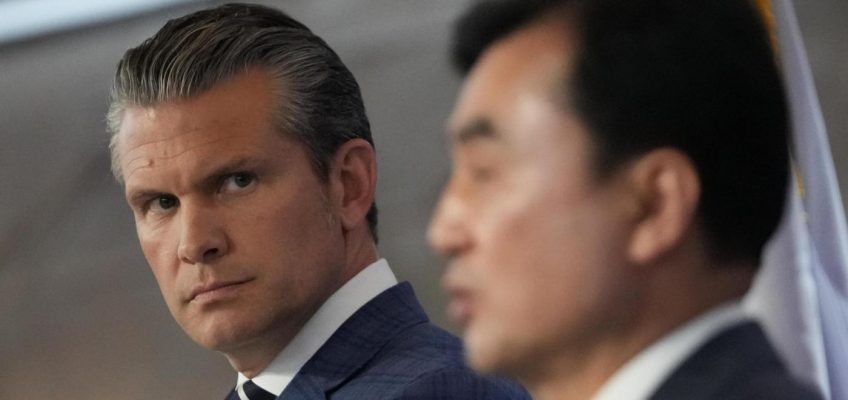By HYUNG-JIN KIM and KIM TONG-HYUNG, Associated Press
SEOUL, South Korea (AP) — U.S. Defense Secretary Pete Hegseth praised South Korea’s plans to raise its military spending, saying Tuesday that the Asian ally will take a larger role in defending itself from North Korean aggressions as the allies must brace for “regional contingencies.”
In this photo provided by the South Korea Defense Ministry, U.S. Defense Secretary Pete Hegseth, second from left, and South Korean Defense Minister Ahn Gyu-back, center, visit the Observation Post Ouellette near the border village of Panmunjom, South Korea, Monday, Nov. 3, 2025. (South Korea Defense Ministry via AP)
Modernizing the decades-long alliance between the U.S. and South Korea is a hot issue between the U.S. and South Korea, as the U.S. apparently wants South Korea to increase its conventional defense capabilities so that Washington can focus more on China.
After annual security talks with South Korean Defense Minister Ahn Gyu-back in Seoul, Hegseth told reporters that he was “greatly encouraged” by Seoul’s commitment to increase defense spending and make greater investments in its own military capabilities. He said the two agreed the investments would bolster South Korea’s ability to lead its conventional deterrence against North Korea.
In a speech at parliament on Tuesday, South Korean President Lee Jae Myung asked lawmakers to approve an 8.2% increase in defense spending next year, which he said would help modernize the South Korean military’s weapons systems and reduce its reliance on the United States.
Hegseth highlighted defense cooperation on repairing and maintaining U.S. warships in South Korea, saying the activities harness South Korea’s world-class shipbuilding capabilities and “ensure our most lethal capabilities remain ready to respond to any crisis.”
“We face, as we both acknowledge, a dangerous security environment, but our alliance is stronger than ever,” Hegseth said.
‘No daylight or differences’
Hegseth said the South Korea-U.S. alliance is primarily aimed at coping with potential North Korean provocations, but must also keep other regional threats in view.
Related Articles
Dick Cheney, one of the most powerful and polarizing vice presidents in US history, dies at 84
What to watch on Election Day 2025: Trump’s strength, Democrats’ message and the shutdown effect
Mamdani and Cuomo face off as New York City chooses new mayor, while Sliwa hopes for an upset
California voters take up Democrats’ push for new congressional maps that could shape House control
Virginia governor’s race will test Trump and Democrats nationally — and make history
“There’s no doubt flexibility for regional contingencies is something we would take a look at, but we are focused on standing by our allies here and ensuring the threat of the DPRK is not a threat to the Republic of Korea and certainly continue to extend nuclear deterrence as we have before,” he said.
DPRK stands for the Democratic People’s Republic of Korea — North Korea’s official name — while Republic of Korea is South Korea’s formal name.
In recent years, the U.S. and South Korea have been discussing how to integrate U.S. nuclear weapons and South Korean conventional weapons in various contingencies. South Korea has no nuclear weapons and is under the U.S. “nuclear umbrella” security commitment.
Ahn denied speculation that South Korea could eventually seek its own nuclear weapons program or is pushing for redeployment of U.S. tactical weapon weapons that were removed from South Korea in the 1990s. He stressed that Seoul remains committed to the nuclear non-proliferation treaty.
“Because we cannot have nuclear weapons, a system integrating U.S. nuclear capabilities and South Korea’s conventional weapons, the CNI (conventional-nuclear integration) framework, has been established,” he said.
Hegseth and Ahn did not issue a joint statement after the meeting, leaving the details of their agreements unclear. It’s unusual for the two countries’ defense ministerial talks to end without an immediate joint statement. But Hegseth said there was “no daylight or differences” between the two countries, only “a bigger deal which takes a little bit more time.”
U.S. Defense Secretary Pete Hegseth speaks during a joint press conference with South Korean Defense Minister Ahn Gyu-back, following the 57th Security Consultative Meeting at the Defense Ministry in Seoul, South Korea, Tuesday, Nov. 4, 2025. (AP Photo/Lee Jin-man, Pool)
During a separate meeting with Hegseth later Tuesday, Lee reiterated his support of an implementation of a previous agreement to transfer wartime operational control of the allied forces to a binational command led by a South Korean general. Currently, the commander of the 28,500 troops in South Korea has wartime operational control of the allied forces, including the South Korean military.
Lee said South Korea taking greater defense responsibilities on the Korean Peninsula would lessen U.S. military burdens in the region, according to Lee’s office. Many South Koreans view regaining their military’s wartime operational control as a matter of national sovereignty.
North Korean artillery tests before Hegseth’s arrival
North Korea didn’t immediately comment on the Hegseth-Ahn meeting.
South Korea’s Joint Chiefs of Staff said earlier on Tuesday that it detected the North test-firing around 10 rounds of artillery toward its western waters on Monday, shortly before Hegseth arrived at an inter-Korean border village with Ahn to kick off his two-day visit to South Korea.
The joint chiefs said the North also fired the same number of rounds Saturday afternoon, before a summit between Lee and Chinese President Xi Jinping, where Lee called for a stronger role by Beijing to persuade the North to return to dialogue with Washington and Seoul.
North Korea had expressed irritation over the agenda of the Lee-Xi meeting, ridiculing Seoul for clinging to a “pipe dream” that the North would one day give up its nuclear weapons.


Leave a Reply